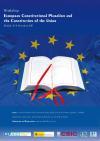European Constitutional Pluralism and the Constitution of the Union
Jue, 10-11-2011; 00:00 hasta Vie, 11-11-2011; 00:00
Otras sedes
Centro de Estudios Políticos y Constitucionales. Pza. Marina Española 9 (Madrid)
The key theme that will be addressed at the RECON (Reconstituting Democracy in Europe) conference is the question of how Europe understands and manages its underlying constitutional pluralism. European constitutional pluralism results from at least two major features of European constitutional practice/settlement.
Firstly, is that the European Union should be properly described as a constitutional union of already existing constitutional states. European integration was constitutionally mandated (through constitutional provisions and as reflected in the constitutions/constitutional practices of the Member States), thus integration has resulted in the creation of a new constitution (the supranational one) which is supported and defined by the continuing presence of national constitutions. The supranational constitution does not supersede national constitutions, but actually gives them a new lease of life, and realizes their will to structure social and political life at a supranational level. But this leaves us with a situation wherein which citizens seem to have two, and not one fundamental laws: the supranational and the national.
Secondly, European integration would be realized through institution-building. The fledgling supranational institutional structure was not only incomplete, only to be completed over time, but was also not placed in a hierarchical relationship vis-à-vis national institutional structures. In genealogical terms, national institutional structures have served as templates for the supranational ones, although the forms of transfer have varied, and been contested, as different national institutional traditions have competed to shape and mould the various aspects of the European institutions. In functional terms, however, no institution, not even law-adjudicating institutions, has been given the last word or hierarchical primacy. As a result, the European constitution is a regulatory ideal grounded in a pluralistic set of constitutional norms and in a plurality of institutional structures, without a vertical hierarchisation of them.
European constitutional pluralism represents a defining feature of the many peculiar traits of the EU as a political community and of EU law as a legal order. It is fundamental to the understanding of the Union’s historical evolution (indeed we cannot understand current developments such as the Lisbon Treaty and the process of forging it without a good handle on this issue); to the understanding of the character and the distinctness of the EU qua polity; it is essential to every effort at conceptualizing and assessing the democratic legitimacy of the European Union; and in general, in the building of a constitutional theory of European integration, of a public philosophy of European integration capable of serving as a practical guide in solving the key issues in the constitutional adjudication of Community law.
Organiza: Carlos Closa (IPP-CCHS)
Inscripciones: contactar a patricio.galella [at] cchs.csic.es (Patricio Galella)



